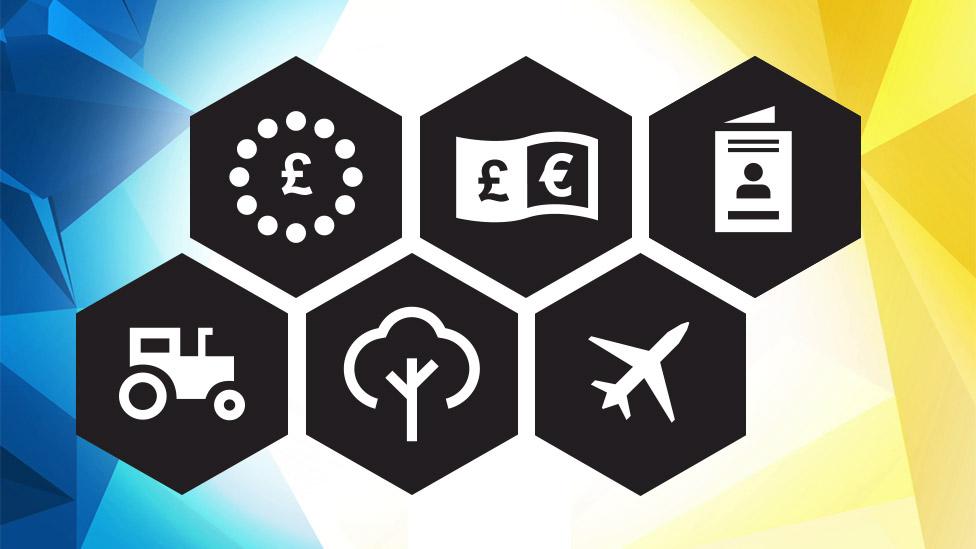EU referendum: Would Brexit make Putin happy?
- Published
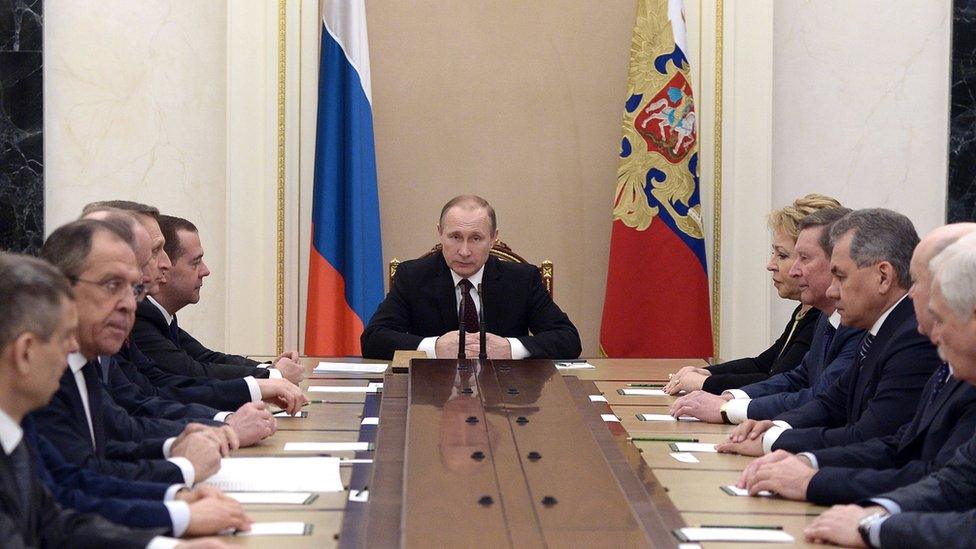
President Putin is in dispute with the EU over the future of Ukraine
You don't have to be British to have an opinion on Brexit.
In recent weeks a string of world leaders have expressed their views on the UK's EU referendum. And the vast majority of them back Britain remaining in the EU.
"If the countries that are closest to you, those who you have a special relationship with, are suggesting you might be better off staying in this relationship with Europe, it's worth paying attention," said US President Barack Obama.
"The United Kingdom needs Europe and Europe needs the United Kingdom," said European Council President Donald Tusk.
And what has Russian President Vladimir Putin said about Brexit?
Absolutely nothing. The Kremlin has been keeping silent on the matter.
That has not prevented Russia from being sucked into the Brexit debate. Prime Minister David Cameron said recently that Mr Putin "might be happy" if Britain left the EU.
UK Foreign Secretary Philip Hammond was even more direct. "The only country, if the truth is told, that would like us to leave the EU is Russia," he said. "And that should probably tell us all that we need to know."
Assertions like that leave Russian officials rolling their eyes.
"Russia is blamed for everything," Russian foreign ministry spokesperson Maria Zakharova told me. "Not only in the UK but all over the world.
"We're watching, for example, the presidential campaign in the United States and we're also mentioned there. So it's not surprising for us. But Russia has nothing to do with Brexit at all. We're not involved in this process. We have no interest in this field."
'Zero sum game'
Russia is, indeed, "not involved": after all, it's not Russian voters who will decide whether the UK is in or out of the EU.
But "no interests in this field"? That is debatable.
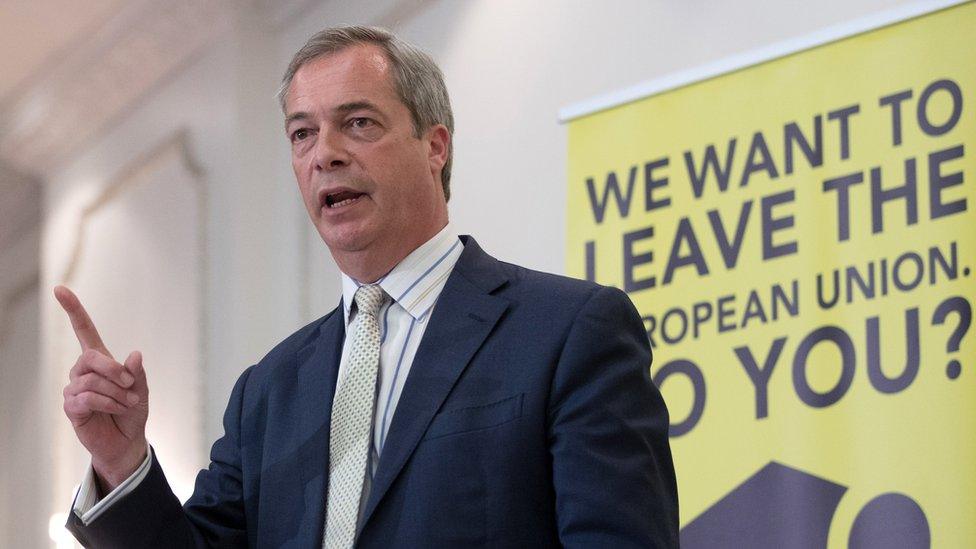
Nigel Farage - a leading Brexit campaigner - admires Mr Putin and deplores EU policy on Ukraine
"If there's a Brexit, if there's a crisis in the European Union, this will be a local propaganda victory," claims Prof Sergei Medvedev from Moscow's Higher School of Economics. He believes the Kremlin's calculation is a simple one: Brexit = a weaker EU = a stronger Russia.
"Moscow sees everything as a zero sum game," Prof Medvedev says.
"So, what's bad for the European Union is good for Russia. It's as simple as that. They don't think further, about the EU being their biggest trading partner, about the question of visa-free travel, that there'll be bigger transaction costs for Russian business. No, they don't think in this way: it's either/or."
As part of this geopolitical "game", Moscow has been cultivating bilateral relations with those EU states it sees as "friendly" to Moscow, such as Greece, Austria, Hungary and Slovakia.
One of the aims is to break the EU's unanimity over sanctions against Russia. Even in those EU countries that have adopted a tougher stance towards Moscow, the Kremlin is seeking friends.
Sanctions were imposed over Russia's 2014 annexation of Crimea, and ratcheted up when pro-Russian separatists took over parts of eastern Ukraine.
Earlier this year, Mr Putin hosted the Bavarian leader Horst Seehofer, a fierce critic of German Chancellor Angela Merkel. The invitation came across as classic "divide and conquer" tactics.
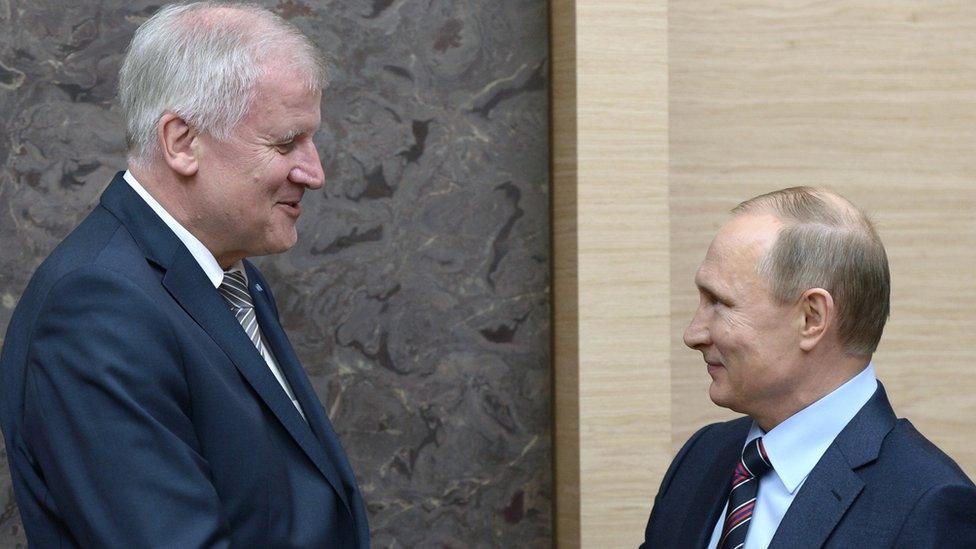
In February Mr Seehofer sought to reinvigorate Bavarian business ties with Russia
Some Western governments also accuse the Kremlin of trying to sow discord in the EU by supporting nationalist parties in Europe.
EU 'in deep crisis'
"Russia will not cry very much if the EU will be in deeper decline, but to be honest we don't have to make big efforts," says Fyodor Lukyanov, editor-in-chief of the journal Russia In Global Affairs.
"That's because the European Union is in a very deep conceptual crisis. All anti-European and xenophobic forces are arising not because of support from Moscow. They are because of profound domestic contradictions in the European Union. The fact that any outside rivals or opponents try to use domestic problems in their own interest - that's unfortunately the normal thing for politics."
Aside from sanctions, there is another reason why Russia resents the EU: it sees it as an exclusive club designed to marginalise Russia.
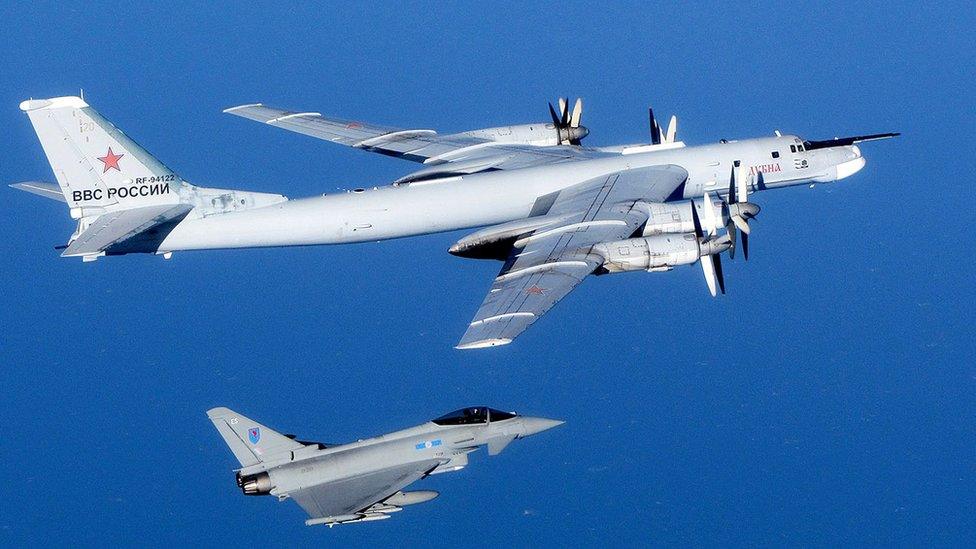
UK fighter jets are sent to monitor Russian bombers flying over the North Sea
Earlier this year I attended a meeting in Moscow between Russian senators and European politicians and policymakers. In his speech, the head of the foreign affairs committee of the upper house of parliament, Konstantin Kosachev, claimed that the EU and Nato had broken the 1990 Paris Charter, which formalised the end of the Cold War.
"This document referred to three international organisations that would define the future of Europe and the world - the UN, the OSCE [Organisation for Security and Co-operation in Europe] and the Council of Europe," Mr Kosachev said. "You won't find a single mention of Nato. And the EU is mentioned only once in the economy/trade section.
"It was envisaged that Europe's future would be decided by national governments. But Nato and the EU had no intention of building a Europe of equals."
Mr Kosachev failed to mention that a year after the Paris Charter, the Soviet Union fell apart and the face of Europe changed. The European Union itself was only established in 1993, when it replaced the European Economic Community (EEC). And when EU-Russian relations were enjoying warmer times, Moscow rarely accused Brussels of violating the Paris Charter.
Even if Brexit were to weaken the EU, Moscow knows it still needs a relationship with Brussels.
"Even a weakened European Union is still a union," says Fyodor Lukyanov. "For Russia it would be easier to deal with individual countries, especially the big countries of the EU. But I don't think anyone in Moscow thinks this is possible."
- Published2 June 2016
- Published2 June 2016
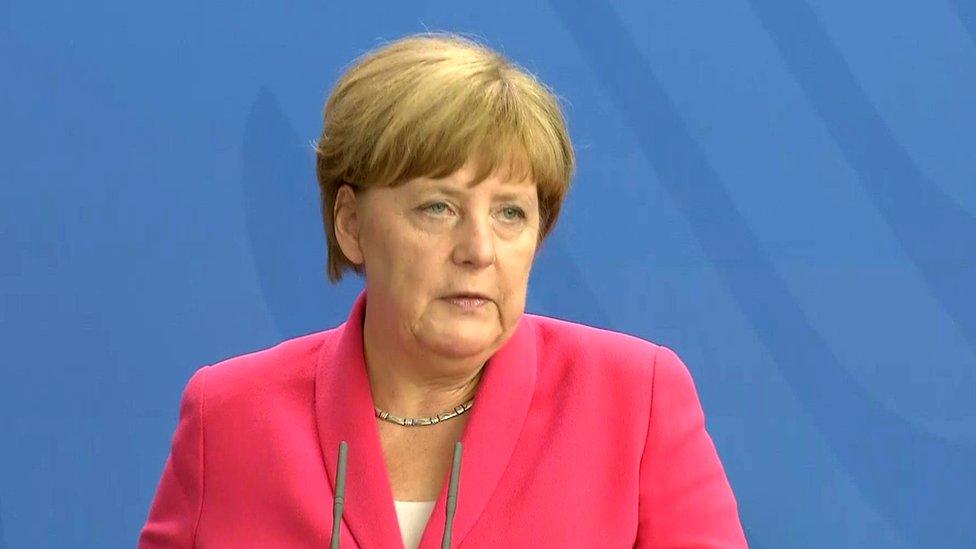
- Published31 May 2016
- Published30 December 2020

- Published29 April 2016
